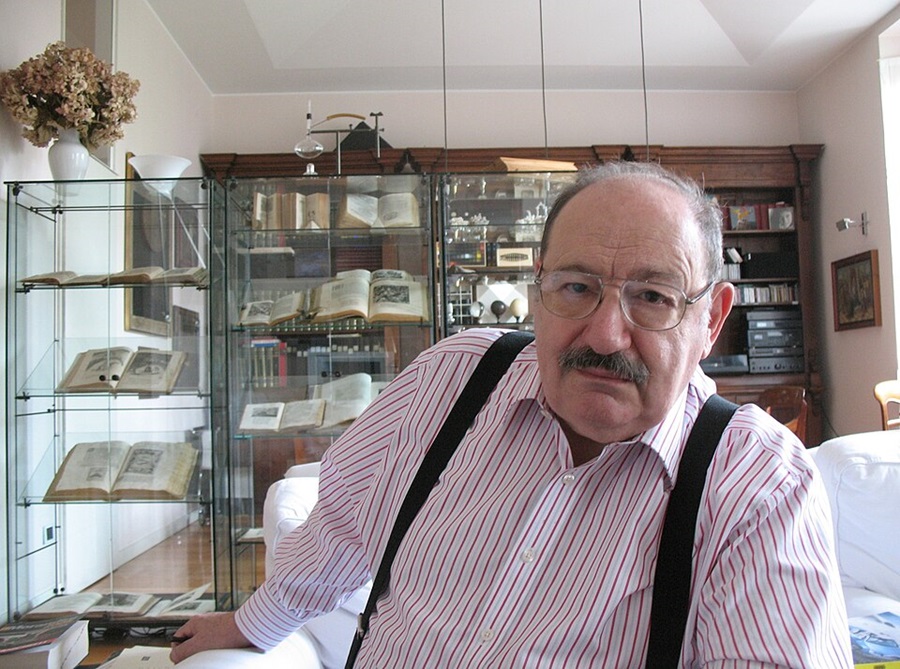- Opinion
- 8 de April de 2025
- No Comment
- 8 minutes read
Eco or the Art of Forming by Informing

Eco or the Art of Forming by Informing


Albert Pérez Bea
“In the future, the aim of education will be to learn the art of filtering. There is no longer any need to teach where Kathmandu is or who the first king of France was, because such information is now readily available everywhere. Instead, we should ask students to analyse fifteen sources and decide which one they consider the most reliable. We must teach them the technique of comparison”. So declared Umberto Eco in one of his final interviews.
Those who believe that the semiotician has left us are mistaken. The professor lives on — still among us. Prophetic and provocative in equal measure, he was, above all, a teacher of teachers. He lives not only through the texts he wrote, but also in the tens of thousands of former students who once crowded into his lectures — often sitting on the floor, or on the steps, wherever there was space.
Ranked among the ten most influential writers of the second half of the twentieth century, Eco taught in the old-fashioned way, though always from a defiantly contemporary standpoint, standing in opposition to those who favoured a simplified model of education and an uncritical embrace of technology in the classroom. His defence was always rooted in the classics.
To Eco, a classic was, in essence, something we were forced to read in school, so that “when we hear mention of a classic, we instinctively take a defensive stance… Yet”, he added, “if we go by Bloom’s canon, a classic is simply a book that has endured”. He believed that the exercise of memory through the classics, through schoolwork — even through that dreaded word, “homework” — contributed to longevity. He was one of the architects of the idea of the “universal library”: a vast, unreachable ideal, yet one that made knowledge more democratic, enabling access to new spheres of thought.
For the wise Piedmontese scholar, the student often had a point — especially when challenging him after having done their own research. “Because above all”, he said, “a teacher must not only inform, but form”. What makes a lesson truly worthwhile is not the accumulation of data, but the creation of dialogue — the confrontation of ideas, the friction between what is taught in school and what comes from beyond its walls.
Eco never shunned the rise of the internet or the digital media. One need only revisit his Apocalypse Postponed, a 1964 book based on essays from the 1950s that remains remarkably relevant today. At the time, the divide between the “apocalyptic” and the “integrated” described how intellectuals viewed not only the mass media (particularly television), but mass culture as a whole: from comic books to pulp fiction, from celebrity tabloids to popular music. So how can a book written in 1964 help us understand Eco’s position on the internet and digital technologies fifty years later?
In brief, the apocalyptic thinkers claimed that the mass media, in attempting to appeal to a vast and heterogeneous audience, had to dilute and standardise their content — thereby losing originality and promoting a conformist vision of society, politics, consumption, and life itself, all while fostering passive, uncritical behaviour. The integrated, on the other hand, argued that the mass media made information available to a vast audience —something unimaginable before television—whereas previously, such knowledge had been accessible only to an elite. They viewed mass culture as a fundamentally positive development — even in its most homogenising aspects — for its ability to introduce new languages, styles, and perspectives.
When the internet arrived, Eco approached it with passion, critique, and constructiveness. He was never uncritical — but neither was he dogmatic. He belonged to no camp. He was never wholly for or wholly against; on the contrary, he was always both — and neither. To the apocalyptic question “Where are we heading?”, Eco replied that we should simply continue along the path we are already on. Papyrus allowed knowledge to be taken out of the temples; medieval copyists preserved and disseminated it; the printing press ushered in the Enlightenment. The internet, he argued, was no different from these earlier revolutions. “What matters is the content, not the container”, he often insisted.
His relationship to almost everything was marked by ambivalence — the hallmark of a true scholastic. Both in academic circles (his 1964 book has been reprinted and translated countless times) and in the mass media themselves, the opposition between apocalyptic and integrated thinkers has become so ingrained that it is now a slogan, used uncritically by many who neither know its origin nor have read the book. “With six billion people on the planet”, Eco once remarked, “we cannot expect to have six billion intellectuals. We must be a little aristocratic in this regard”. It is worth noting that in the two decades since he uttered these words, we have already passed the eight-billion mark.
“The great challenge for today’s school”, Eco argued, “is how to teach students to filter the information they find online. This is something no teacher does, because they themselves are novices in using this tool. It is one of the great dramas of our time”. He proposed that newspapers devote two pages to the critical analysis of websites. “If social media are the press’s greatest threat, then rather than imitating the internet, newspapers should engage in a critique of it — highlighting what is false and what is not”.
His second proposal concerned the classroom. “Teachers should boldly say to their students: ‘Here is your topic. Feel free to copy from the internet — copying can be a virtue — but you must consult at least ten different sites’”. This, he explained, would compel students to compare sources, uncover contradictions, and confront the issue critically. “Why shouldn’t a teacher take on that role?”
E se non è vero, è ben trovato. Even if it were not strictly true, if Eco said it, there must be a reason — one forged through tens of thousands of hours of lectures, conferences, talks and interviews. It was he who hammered home the ultimate purpose of education: to teach how to think — not what to think.
Source: educational EVIDENCE
Rights: Creative Commons

